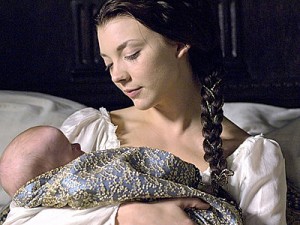 At three o’clock in the afternoon, of 7th September 1533, just thirteen days after she had taken her chamber at Greenwich Palace, Anne Boleyn gave birth to a healthy daughter.
At three o’clock in the afternoon, of 7th September 1533, just thirteen days after she had taken her chamber at Greenwich Palace, Anne Boleyn gave birth to a healthy daughter.
The birth had been straightforward, and mother and baby were both fine, but the baby was not the boy that astrologers had predicted, or that Henry VIII thought that God would bless his new marriage with. Letters had already been written giving thanks to God for sending Anne “good speed, in the deliverance and bringing forth of a prince”, and they had to be altered. An ‘s’ was adding to the word ‘prince’. A celebratory joust was cancelled, like it had been when Mary had been born in 1516, but a herald proclaimed the good news, a Teu Deum was sung at the Chapel Royal and a lavish christening was planned. The baby’s gender may have been a disappointment, but she also gave hope. Her birth showed that Anne Boleyn was fertile and could carry a healthy baby to term. There was hope for the future, sons could follow.
The little girl was named Elizabeth, the name of both her grandmothers, and we know her now as Elizabeth I, the famous Tudor monarch who has gone down in history as the Virgin Queen and Gloriana. She certainly wasn’t a disappointment as a monarch.